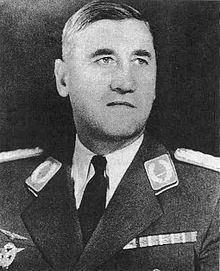Miroslav Navratil
Miroslav (Friedrich) Navratil | |
|---|---|
 | |
| Born | 19 July 1893 Sarajevo, Condominium of Bosnia and Herzegovina |
| Died | 7 June 1947 (aged 53) Zagreb, People's Republic of Croatia, FPR Yugoslavia |
| Allegiance | |
| Service/ | Aviation |
| Rank | General |
| Unit | Flik 41J |
| Commands held | Flik 3J |
| Battles/wars | World War IWorld War II |
| Other work | Minister of Armed Forces of the Independent State of Croatia |
Miroslav (Friedrich) Navratil (19 July 1893 – 7 June 1947) was a Croatian soldier, pilot, and general who served in the armies of Austria-Hungary, the Kingdom of Yugoslavia, and the Independent State of Croatia.
Until the end of World War I
Navratil was born in Sarajevo in the Condominium of Bosnia and Herzegovina. He attended gymnasium in Sarajevo, and finished cadet's school in Graz. In World War I he served in the military of Austria–Hungary, as a fighter pilot in the Imperial and Royal Aviation Troops. While on the Eastern and Italian fronts, he scored a victory with Flik 41J on 14 April 1918, before assuming command of Flik 3J on 9 June 1918. Flying Albatros D.IIIs, he scored nine more victories.[1]

He attained the rank of Oberleutnant.[2] His victory string ran until 31 August, when he downed a Bristol F.2 Fighter, but lost all four of his inexperienced wingmen in the process. Navratil blamed himself for their loss. He largely removed himself from combat operations. On 21 October, during a test flight of an Albatros D.III, his seat broke, and he was injured in the resultant crash landing. He did not recover before the Armistice.[3]
Between the World Wars
In 1918, Austria-Hungary dissolved and Navratil moved to the newly formed Kingdom of Serbs, Croats and Slovenes, where he took on a position in the royal army. He rose to the rank of colonel, but was eventually retired from the army in 1940 because of conflict with Serb officers within its ranks.[1]
World War II
With the establishment of the Independent State of Croatia on 10 April 1941 Navratil was brought back into active service. He was named as a military representative in Bucharest. He served as minister of the armed forces from 2 September 1943 to 29 January 1944. After he was relieved of his post, reportedly due to complaints about the brutality of the government, he traveled to Vienna, where his family was located and remained there until the end of World War II. In 1945 he moved to Zell am See, where he lived until he was located by American troops in 1946. He was extradited to communist Yugoslavia in December 1946. In Zagreb he was sentenced to death on charge of war crimes,[3] and executed on 7 June 1947.[1]
Awards
- Order of the Crown of King Zvonimir with Swords - September 1943
Notes
- ^ a b c Eleršek, Leonard (November 2008). "Miroslav Navratil, dvostruki as austrougarskog zrakoplovstva". Hrvatski vojnik (in Croatian) (213). Archived from the original on 26 September 2013. Retrieved 7 April 2013.
- ^ Friedrich Navratil, The Aerodrome
- ^ a b Austro-Hungarian Aces of World War 1. p. 81.
References
- O'Connor, Dr. Martin: Air Aces of the Austro-Hungarian Empire 1914–1918. Flying Machines Press, Mountain View (Californien) 1986, ISBN 1-891268-06-6
- Tko je tko u NDH, "Miroslav Navratil". Minerva. Zagreb, 1997.
- Chant, Christopher. Austro-Hungarian aces of World War 1 Osprey Publishing, 2002. ISBN 1-84176-376-4, ISBN 978-1-84176-376-7.
- Use dmy dates from November 2011
- 1893 births
- 1947 deaths
- Military personnel from Sarajevo
- Austro-Hungarian World War I flying aces
- Austro-Hungarian military personnel of World War I
- Croatian people of World War I
- Croatian soldiers
- Croatian collaborators with Nazi Germany
- Executed Yugoslav collaborators with Nazi Germany
- Croatian military personnel of World War II
- Croatian Home Guard personnel
- Government ministers of the Independent State of Croatia
- Recipients of the Order of the Crown of King Zvonimir
- Executed Croatian people
- Executed Bosnia and Herzegovina people
- Recipients of the Iron Cross (1914), 2nd class
- Recipients of the Order of the Iron Crown (Austria)
